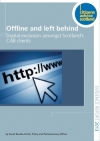-
 Submission to the Work and Pensions Select CommitteePublication date:May 2013
Submission to the Work and Pensions Select CommitteePublication date:May 2013The Work and Pensions Select Committee at the House of COmmons is holding an inquiry into the effectiveness of Jobcentre Plus, particularly in the context of current welfare reforms.
Spotlight: -
Publication date:May 2013
CAS responds to the HMRC's consultation on supporting customers who need additional help. We focus on our experience of supporting clients with tax credits issues.
Spotlight: -
 Publication date:May 2013
Publication date:May 2013In early 2013, the Scottish Government put the Courts Reform (Scotland) Bill out for consultation. The Bill embodies the changes envisiged in the Gill Review (2007) and includes proposals for the introduction of a new judicial tier as well as a specalist personal injury court. This is the Citizens Advice Scotland response.
Spotlight: -
Submission to the Public Administration Select Committee inquiryPublication date:May 2013
Citizens Advice Bureaux experience very significant difficulties resolving problems with benefits and tax credits on behalf of clients. A complaints mechanism is only as good as the system it supports. Where there is a lack of faith in the system itself, it is likely there will also be a lack of faith in the complaints procedure.
Spotlight: -
 Digital exclusion amongst Scotland's CAB clientsPublication date:May 2013
Digital exclusion amongst Scotland's CAB clientsPublication date:May 2013In November 2012, the UK Government launched its Government Digital Strategy . This paper sets out how the Government will transform the way it delivers services to citizens, including moving services online – a change in ethos to “digital by default”. The strategy includes an expectation that 80% of benefits applications will be completed online by 2017 . This new strategy comes at the same time as the Government’s changes to the welfare system which, coupled with at least £18 billion of cuts to the UK welfare budget, will cause significant upheaval for citizens currently in receipt of benefits.
Spotlight: -
March casesPublication date:May 2013
Citizens Advice Bureaux in Scotland help hundreds of thousands of people with over half a million new issues each year. Snapshot uses evidence on these issues to act as an early warning system for government, service providers, and private sector companies, to show where policies and practices are failing or inefficient. These monthly briefings use very recent evidence and are an excellent way of spotting trends and tracing the impact of recent policy changes.
This edition is based on the advice needs of clients who approached bureaux during March 2013.
-
 Publication date:April 2013
Publication date:April 2013The Scottish Government consulted in early 2013 on the possibility of achieving better dispute resolution in housing through introducing a Housing Tribunal. The consultation sought views on the creation of such a forum and the extent to which a tribunal should have powers. This is the CAS response.
-
 Publication date:April 2013
Publication date:April 2013105,000 households in Scotland will lose £53 million in housing support due to changes coming into force in April 2013. This is the result of new size criteria for social housing – dubbed the ‘bedroom tax’ – which will see working age tenants penalised an average of £11 per week for under occupying their homes. An estimated 83,000 households affected by the change contain at least one disabled adult.
Spotlight: -
 The impact of benefit reforms, changes and cuts on people and families in ScotlandPublication date:March 2013
The impact of benefit reforms, changes and cuts on people and families in ScotlandPublication date:March 2013In October 2011, Citizens Advice Scotland published a briefing entitled The Impact of the Welfare Reform Bill on Scotland’s people and services. The briefing showed that an estimated £2.5 billion would be taken out of the local economy in Scotland during the lifetime of this Parliament and predicted what the impacts would be on people.
Spotlight: -
 Consultation responsePublication date:March 2013
Consultation responsePublication date:March 2013The Department for Work and Pensions is asking for ideas about how they can make jobsearch requirements work for in-work benefit claimants. Read CAS' response here.
Spotlight: -
Publication date:March 2013
CAS's annual report 2011/12. Further copies and the full financial expenditure report are available on request.
-
 What Scotland needs from an independent Scottish welfare systemPublication date:March 2013
What Scotland needs from an independent Scottish welfare systemPublication date:March 2013The Scottish Government has set up an Expert Group to examine what a benefits system could look like in an indepedent Scotland. The publication sets out what CAS believes are the core principles for a new social security system for Scotland.
Spotlight: -
January casesPublication date:February 2013
Citizens Advice Bureaux in Scotland help hundreds of thousands of people with over half a million new issues each year. Snapshot uses evidence on these issues to act as an early warning system for government, service providers, and private sector companies, of where policies and practices are failing or inefficient. These monthly briefings use very recent evidence and are an excellent way of spotting trends to social policy and tracing the impact of recent policy changes.
This edition is based on the advice needs of clients who approached bureaux during January 2013.
Thank you to all bureaux for their feedback, without which this type of publication would not be possible.
Spotlight: -
 Publication date:February 2013
Publication date:February 2013A short briefing on the work of the citizens advice service in Scotland.
Spotlight: -
 Publication date:February 2013
Publication date:February 2013In November 2012, the UK Government launched its Government Digital Strategy . This paper sets out how the Government will transform the way it delivers services to citizens, including moving services online – a change in ethos to “digital by default”. Citizens Advice Scotland is concerned that a digital by default approach to welfare benefits could exclude some of the most vulnerable and marginalised members of society from accessing the very services they rely upon.
Spotlight: -
 Publication date:February 2013
Publication date:February 2013In April 2013, the general consumer advocacy functions of Consumer Focus and the Office of Fair Trading’s responsibility for consumer-facing education will both transfer to the Citizens Advice service. This is part of an on-going series of reforms to the consumer landscape in which the Government intends for the Citizens Advice service to become the publicly-funded voice for consumers.
Spotlight: -
 Publication date:February 2013
Publication date:February 2013Based on the responses from bureau advisers to the recent Social Policy questionnaire, the Policy and Communications team have put together a forward work plan for 2013/14. This covers the issues that we plan to address over the coming year and the ways in which we plan to undertake this work.
Spotlight: -
 Publication date:February 2013
Publication date:February 2013Citizens Advice Scotland welcomes the initiative from the Scottish branch of the Trading Standards Institute to address the problem of cold calling for the purposes of property maintenance and repairs. This briefing uses the evidence from the Citizens Advice Consumer Service helpline to demonstrate the consumer detriment caused by such practices.
-
 Publication date:February 2013
Publication date:February 2013The Economy, Energy and Tourism Committee launched an enquiry into the issue of underemployment which CAS and Norma Philpott (Chief Executive of CARF) were invited to provide oral evidence to on the 23rd January. This written evidence followed the oral session, reinforcing the arguments made on the day.
Spotlight: -
 Publication date:January 2013
Publication date:January 2013In April 2012, changes to the number of working hours that couples must work to be eligible for Working Tax Credit affected thousands of families in Scotland. Around 11,770 families, with over 23,500 children, faced losing their Working Tax Credit payments (worth an average of £2,600 per year) if they could not increase their working hours to at least 24 hours per week. Case evidence from bureaux and other sources suggest that claimants have struggled to increase their working hours in the middle of a double dip recession. The outcome of this change is therefore likely to be that thousands of low income families in Scotland have lost millions of pounds of support.
Spotlight:
Stressed About Debt? High costs of energy, food and fuel mean that many people are finding it impossible to keep up, worrying about debt or falling behind on bills. The Citizens Advice network in Scotland is here for you, with free, confidential and impartial advice in a variety of ways.